February 28, 2019 Leave a Comment
Packed with nutrients and fiber, papaya is called the ‘fruit of the angels’. But Can I give my baby papaya? Let’s find out in this post.
Buy Homemade Baby & Toddler Food from a Doctor Mom's KitchenOrganic · FSSAI Certified · NABL Lab certified Buy Sprouted Sathumaavu Health Mix powder for Babies / Homemade Cerelac Dry Fruits Powder for Babies/Toddlers Pancake Mixes for Toddlers
Papaya is no stranger to Indians. In fact, this is a fruit that can be found in most backyards of South India. It is so familiar that it may be surprising to find that Christopher Columbus named this fruit the “fruit of the angels”.
The origin of papaya is unclear, but the most common belief is that it was discovered by Christopher Columbus when he arrived at South America. Earlier papayas had a reputation of being exotic, but today, papayas are widely grown in Central America, Africa and Asia. In some places, they are also referred to as ‘tree melons’.
Papayas are cultivated throughout the year in the tropical regions. The hot climate plays a major role in the growth and production of fruit. In hot regions, it can take as little as six to nine months from the date of planting the trees till the time of harvest. However in cooler climes, it may need nine to 11 months for harvest. Papaya trees can live for 20 years.
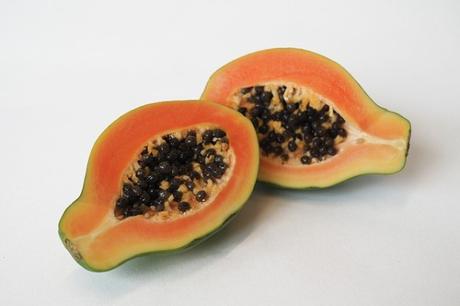
Papayas can be consumed ripe or raw. Raw papaya is used in curries, dishes, sauces, salads, stews etc. and the ripe ones are usually eaten raw or blended into smoothies and milkshakes. Even the leaves and seeds are edible in their own way. The seeds have a peppery taste, due to which it is used as a substitute for black pepper in some countries. The latex found in the papaya tree as well as in the unripe fruit are rich in an enzyme called papain. Papain is commonly used as a meat tenderizer. Papaya leaf tea is popular in tropical regions to treat a number of ailments. Recent research suggests that papaya leaf may help in fighting cancer.
Nutritional Benefits of Papaya
Papaya is low in fat, calories and rich in vitamin C. It is also a good source of vitamin A, folate, potassium, magnesium and fiber as well as antioxidants and B vitamins. Here are some of the health benefits of papaya:
- Boosts immunity
- Heals Skin Sores
- Improves digestion and prevents Constipation
- Improves Metabolism and aids weight loss
- Fights Against Intestinal Worms
- Stabilizes Hemoglobin levels
- Maintains Eye Health
- Helps Ease Menstrual Pain
- Good for Diabetics.
- Protects Against Arthritis and heart disease
Can I give my baby Papaya?
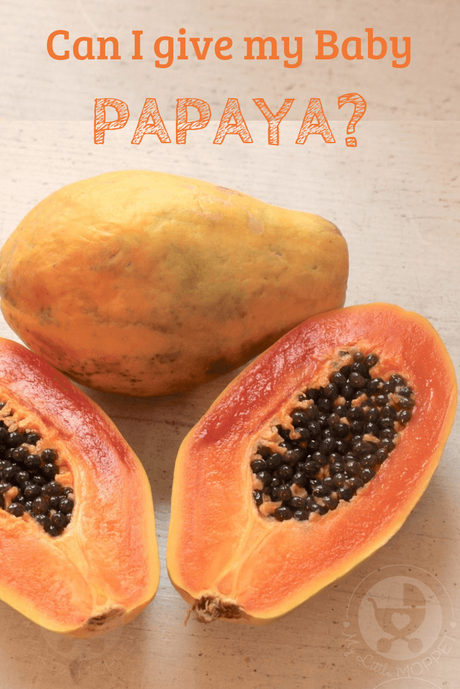
Papayas are excellent for infants, although not as a first food. The recommended age to introduce papaya is between 7-8 months, after introducing foods like rice, dal, sweet potato, squash and banana. It’s best to feed babies papaya during the meal rather than after.
The rich fiber of papaya acts as a natural laxative and helps in regularizing bowel movements in babies. However, unripe papaya can contain latex, which can cause trouble for babies with food sensitivities. When feeding baby, cut the fruit in half, remove the peel, scoop out the seeds and mash the pulp into a puree. Small pieces of ripe papaya can be offered to older babies and toddlers as finger food.
Dried papaya seeds also help in treating intestinal worms in children over one year of age. The seeds can be dried, powdered and mixed with honey and then given for 7 days straight.
Things to Remember
Even though papaya has high fiber and is good for digestive health, eating too much may have a laxative effect, causing diarrhea or an upset stomach. Over consumption may also cause carotenemia, a harmless yellowing of soles and palms.
Babies who are allergic to avocados, bananas or any other foods may have an allergic reaction to papayas too. In such cases, it’s better to consult the pediatrician before introducing papaya. Follow the 3-day rule to be on the safe side,, and start with a small quantity in the beginning.
If the baby displays symptoms like itchy rashes, abdominal pain, burning sensation in the mouth, swelling of the face or shortness of breath, he needs to be rushed to the doctor right away.
Tips for Choosing Papaya for Babies
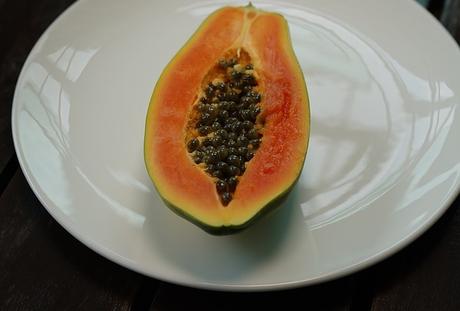
There are two varieties of papayas, Hawaiian and Mexican. The Hawaiian variety is the most common one. They are small to medium-sized with orange-red skin and flesh. The flesh may also be pinkish, with small black seeds clustered in the center.
Mexican papayas are fairly larger and can weigh up to 4-5 kg. The flesh may be yellow, orange or pink with a milder flavor compared to the Hawaiian variety.
Here are some tips to choose good papayas:
- The sweet smell of the papaya indicates that it’s ready to be consumed. The skin of the ripe fruit turns yellow-green or amber with the flesh being a pinkish-orange color. Choose fruits that have a little green so they’ll ripen fully at home.
- Papayas become more delicate when ripe and bruise easily. This can cause the fruit to rot, so avoid overripe fruits, unless you are going to puree them right away.
- While selecting papayas look for a reddish/yellowish color. It should be firm to the touch but not too hard.
- Avoid papayas that have blemishes or cuts and are overly soft.
Tips for Storing Papaya
Ripe papayas can be refrigerated in a plastic bag for up to 1 week. If you want to speed up the ripening, place papayas in a brown paper bag at room temperature. Once the papaya ripens, refrigerate immediately, up to 3 days.
To freeze, peel the papaya, slice it lengthwise and scoop out the seeds. Cut into pieces of required size and pack into air tight containers or heavy-duty plastic freezer bags.
Papaya Recipes for Babies and Toddlers
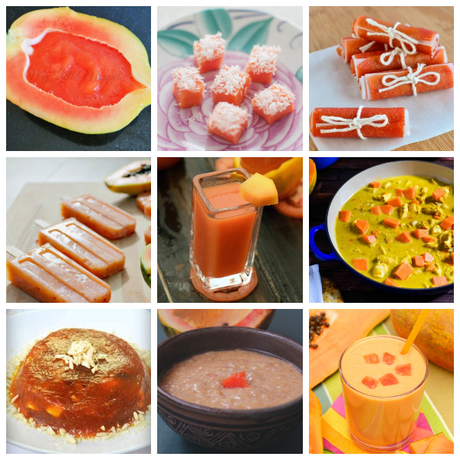
Papaya Puree
Papaya with coconut topping from Smart Bites for Baby
Papaya Fruit Roll Ups from Little Grazers
Papaya Apple Ice Lollies from Baking Queen
Papaya Carrot Orange Juice from Tarla Dalal
Kids Chicken Curry with Papaya from The Gingered Whisk
Papaya Halwa from Cook with Smile
Papaya Oats Kheer from Ooonu Ready
Papaya Pineapple Smoothie from Mom Junction
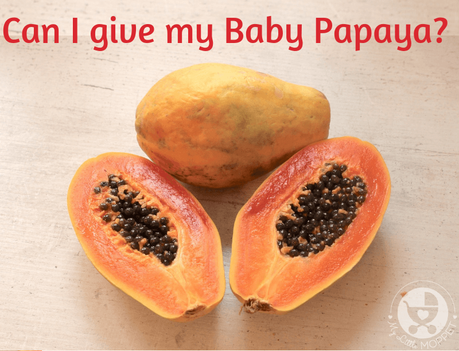
References – [1] J Med Food. 2007 Mar;10(1):194-6. Effectiveness of dried Carica papaya seeds against human intestinal parasitosis: a pilot study. Okeniyi JA(1), Ogunlesi TA, Oyelami OA, Adeyemi LA)
SharePinWhatsApp0 Shares